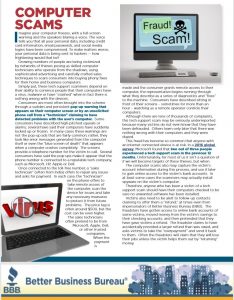Tech support fraud is a growing problem at home and abroad, with hundreds of thousands falling victim to fraudsters claiming to be from reputable technology companies and peddling unnecessary “repair services” for phony computer viruses or malware. Today, the Better Business Bureau (BBB) released a new report, “Pop Ups and Imposters: A BBB Study of the Growing Worldwide Problem of Tech Support Fraud,” which includes facts and insights from Microsoft, the U.S. Federal Trade Commission and others.
We encourage you to check out this report and help raise awareness about this growing issue by sharing it with your family, friends, and colleagues, and via social media.
Tech support scam trends
The FBI’s most recent Internet Crime Report lists tech support fraud in its top cybercrime trends, costing victims nearly $8 million in 2016 alone. Since 2015, Microsoft has received over 300,000 customer reports of tech support fraud, and according to our global survey conducted in 2016, two out three consumers have experienced this type of scam, with one in five losing money to the fraudsters.
Combatting tech support scams
Microsoft’s Digital Crimes Unit (DCU) is a unique group of cybercrime-fighting investigators, analysts and lawyers committed to combating this type of fraud and protecting consumers from becoming victims. Our DCU team and experts across Microsoft use innovative technology to detect how scammers are operating and make referrals to law enforcement. We also work to raise awareness and educate consumers about tech support scams through partnerships with organizations, including the Better Business Bureau and AARP, among others.
Tips to stay safe online and avoid falling victim to scams
Here a few key tips to keep in mind if you receive a notification or call from someone claiming to be from a reputable software company:
- Be wary of any unsolicited phone call or pop-up message on your device.
- Microsoft will never proactively reach out to you to provide unsolicited PC or technical support. Any communication we have with you must be initiated by you.
- Do not call the number in a pop-up window on your device. Microsoft’s error and warning messages never include a phone number.
- Never give control of your computer to a third party unless you can confirm that it is a legitimate representative of a computer support team with whom you are already a customer.
- If skeptical, take the person’s information down and immediately report it to your local authorities.
We also encourage everyone to report their experiences with tech support fraud to your local authorities and to Microsoft at www.microsoft.com/reportascam.

